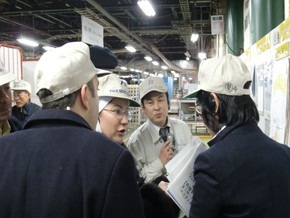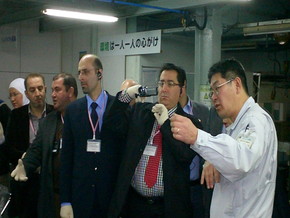Taking Kansai’s “Monozukuri” Spirit to Syria(Feb.4-March 2,2011)
Product quality and cost reduction have become key for maintaining competitiveness for Syriaʼs industries, which are exposed to ongoing open global competition. Therefore, business executives are under pressure to review and bolster management strategies that respond to the times. Through this seminar, which takes a
head-on approach to such needs, 11 Syrian business executives, staff at industrial associations and consultants, who are tasked with providing management support, studied Japanʼs practical
business management, which centers on production control and improvemen(“Kaizen”).

Participants listen intently to an explanation of a case of Kaizen at a factory of Fuji Seat Co..
“Learning in Japan “to join the ranks of global competition”
Syria’s industries had been formed under a structure of national guidance. But amid today’s open global competition, high-quality manufacturing of products on par with their foreign-made counterparts is being demanded.
Through this seminar, business executives,staff at industrial associations and consultants, who are tasked with providing management support, studied Japan’s practical business management. On their return home, they are expected to make solid contributions to the economic development of their own country through the practical application of business practices.
“An effective curriculum structure” that responds to the intense needs of participants
One of the features of this seminar is its structure. Participants learn about Kaizen methods in the morning sessions, and visit companies in the afternoon to learn ties together theories and practices that confirm real-case studies. This leads to the effective use of limited time, in particular by eliminating superfluous
questions during factory visits. Another major feature is the thorough brushingup of action plans that involve three sessions of exchanges of opinions between course leaders and participants, and finishing
with individual guidance. There were times when enthusiastic instruction and opinion exchanges ran nearly two hours beyond scheduled time, and in some of these cases, participants couldn’t help but make major changes to their first drafts. Yet through all this, they never lost an iota of their desire to improve
their drafts’ content.
A “device” to keep running the PDCA cycle continuously after returning home
In addition, when drawing up the action plans, the participants made practical use of “problem-solving sheets” based on situation reports and the plans. Challenging and executable content was drawn up that reflected the narrowing down of objectives, time schedules and the specific subjects of each and every
participant. A framework that smoothly made the shift from the achievements of the first year’s activities to the next cycle was drawn up. In addition, directly after the presentations, summaries of the action plans for people involved on the Syrian side were announced in a TV conference that linked with JICA Syria, and a commitment for plan implementation was formulated.
One more thing: This seminar does its own “Kaizen” every year, and one thing that achieved better curriculum was the gift of solid leadership provided by PREX senior specialists Mr. Yoshioka and Mr. Fukuda, who possess a wealth of Monozukuri experience in the automotive industry, one of Japan’s fortes. To underscore this fact, a flood of emails from the participants arrived right after they had returned home with messages of gratitude attached. I would like to end on that note.

The seminar participants on a trip to Ito Koki Co., Ltd.
Toshihiro SUEO,
General Manager,
International Department
Seminar summary
| Name | Syria Synthetic Business Management Training Seminar |
| Period | Feb. 4 (Fri.)-March 2 (Wed.), 2011 |
| Participants | 11 people consisting of staff members at Syrian industrial associations, executives at private companies and consultants |
| Commissioned by | Osaka International Center, Japan International Cooperation Agency (JICA) |


